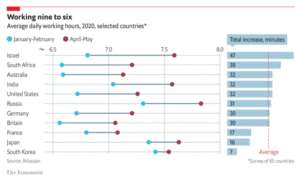Despite proving remote work was a productive alternative to in-office work throughout 2020, many companies are still slow to adopt it.
June 28, 2021
By: Bobby Casey, Managing Director GWP
It feels like that’s where the remote working situation is right now. Employers and workers are looking at each other saying, “Are we doing this remote thing or what?”
Some have fully embraced the idea, especially larger digital companies like Dropbox and Twitter. While others like Barclays and Credit Suisse are very much against it, and insist upon a return to the office.
This isn’t a luxury reserved for only large tech corporations. This is actually a great chance for businesses of all sizes to lean up and focus on their talent and services.
As a location independent expat, I often wonder why embracing remote work and gig workers is such a challenge for so many. But, as a location independent expat, I have a bias toward work that allows for a lifestyle I’ve grown to love.
I’m looking at the corporate headquarters that occupy the buildings in Downtown Los Angeles, in the Financial and Embarcadero Districts of San Francisco, on Park Avenue in New York, on Michigan Avenue in Chicago. What are you guys thinking bringing people back into an office?
From a bottom-line standpoint, ditching your status-symbol office rent should be a no-brainer. Paying ridiculous rent for a corporate office in West Los Angeles, for the sake of saying you have an office in West Los Angeles, is nonsense.
Back in the day, location meant accessibility. That’s how we got these large city hubs. All the different businesses that were linked to other industries moved to central areas for easy access to one another. Made sense when the fasted means of communication was a landline or a courier.
That’s no longer true. Sure face to face meetings matter. And you can still have those. But you don’t need to rent a place in a flashy city all year to have that.
Accessibility on a day-to-day basis is easily offered through a series of internet based services like Zoom and Teams.
So what is it!? What is holding these employers back?
I had to take a step back and look at it without my rosy nomad glasses on, but it’s an amalgam of nebulous office cultures that people know exist, but don’t realize they promote and sustain.
Presenteeism
The first is called “Presenteeism”. Wikipedia defines it as: the act or culture of employees continuing to work as a performative measure, despite having reduced productivity levels or negative consequences.
This also means, showing up when you are preoccupied with other external things like a death in the family, a divorce, having a child, etc. and showing up even when you are sick. S
For some reason, showing up to work equates to being productive and actually working. This isn’t actually true, but it’s a corporate tradition oddly passed on with little overt enforcement from the top.
There’s this cultural assumption that work is a lot like physical education class back in grade school: you can get a passing grade just for showing up. No one knows where it came from, but many workers and employers tend to go along with it, and even promote it through their “team building” or “corporate morale building” exercises and events.
Here’s how…
Halo Effect
For far too long, employers have looked at how long someone works. How early do they come in? How late do they stay? What are their billable hours? How often do they call in sick or take time off?
This assumption has been passively sustained through a halo effect: where you decide something is good based on unrelated factors you also perceive as good.
For example: If you see someone who is attractive, you might assume they are successful. Being attractive has nothing to do with being successful. But you are taking the bias of what you already like, as ascribing further positive assumptions on that person based on that.
In the workplace, people are subtly taught that long hours are met with reward. People then develop a bias that says, “This person is a good worker because they work long hours”.
How many times have people witnessed “Employee of the Month” awards going to the person who is in the office before everyone else, and still there when everyone else leaves? How often are promotions awarded to people like this?
And it’s never the hours that are commended. It’s the “dedication”, “hard work”, “follow through”, or “commitment to client satisfaction” that gets flagged. Still all anyone knows is that person is first in and last out.
The company didn’t have to formalize a policy around Presenteeism. They simply had to reinforce the preexisting assumptions through accolades and recognition, creating the halo effect in other employees.
It sounds insidious, but I don’t think most people realize that’s what they are doing. The people in charge now, learned this from the people in charge before them. It really is just an odd cultural tradition in corporate environments.
If you asked any manager, “Do you care how long someone works as long a the work gets done well and on time?” they would almost instantly respond with, “Absolutely not! I believe in having a work life balance!”
Yet, the overworked and ever present still reap the rewards.
People have built up this bias which suggests: People who come into the office and put in their hours are good workers deserving of praise and promotion.
Literally no data suggests that’s actually true. In fact, quite the opposite! Bloomberg writes:
The work-from-home boom will lift productivity in the U.S. economy by 5%, mostly because of savings in commuting time, the study says. The findings suggest the rapid adoption of new technology amid the pandemic will offer lasting economic gains, helping to boost sluggish productivity that has long weighed on global growth.
The Economist likewise shows the longer hours by those who were working from home during 2020:
Mere-exposure Effect or Familiarity Principle
In addition to seeing someone receive accolades for their long hours (often disguised as work ethic), they just see the person more, as do their uppers. You see someone over and over in a professional context, your encounters are never negative, and others’ perceptions of that person are generally positive, you suddenly start to believe that’s a good person.
It’s called mere-exposure effect or the familiarity principle. Wikipedia defines it as:
“… a psychological phenomenon by which people tend to develop a preference for things merely because they are familiar with them. In social psychology, this effect is sometimes called the familiarity principle… In studies of interpersonal attraction, the more often someone sees a person, the more pleasing and likable they find that person.”
Part of it is the desire to quantify work. That’s easier to do on a production line. If you’re building out something tangible, you are more likely to be able to ascribe a number of hours of work involved from start to finish.
But that’s not where much of the developed world is headed. They are heading toward service, consultation, ideation, strategizing, and none of that is quantifiable in the same way as building a design, a website, a house, or a part.
The Solution
When you buy a lamp at the store, no one breaks down the labor hours, the freight costs, the utility and rent bills for the factory, the packaging costs, that all went into getting that lamp onto a shelf for you to buy. Instead, you get one price for that lamp, which you assume adequately covers the costs entailed in bringing that product to market.
That is how society is to overcome these mental blocks in opening up to remote work. Price out the final product, and restructure how you measure success in your workers. There has to be something better than looking at the time stamp of how late an email was sent, or what time someone shows up to their desk.
Presenteeism favors those who are willing to drive in each day. Which means the company only gets to draw from the local commutable talent pool. Who wins in this situation? A mediocre employee? This artifact of corporate culture needs to end. It’s not only useless to employers, it’s unsustainable for employees.
Focusing on overall production, meeting deadlines, and drawing in the best talent you can find in the world is how your business grows and remains competitive. Take your annual rent and get some awesome talent and tech. Reinvest into your business in ways that will truly pay off in the fast approaching future.
Click here to schedule a consultation on how you can protect your assets from overreaching governments, or here to become a member of our Insider program where you are eligible for free consultations, deep discounts on corporate and trust services, plus a wealth of information on internationalizing your business, wealth and life.



